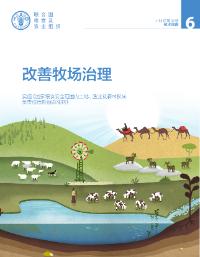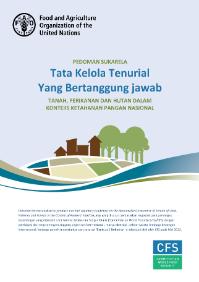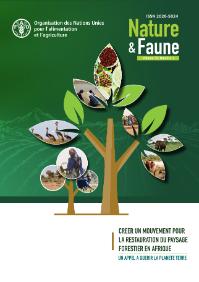Focal point
Location
The Food and Agriculture Organization of the United Nations leads international efforts to defeat hunger. Serving both developed and developing countries, FAO acts as a neutral forum where all nations meet as equals to negotiate agreements and debate policy. FAO is also a source of knowledge and information. We help developing countries and countries in transition modernize and improve agriculture, forestry and fisheries practices and ensure good nutrition for all. Since our founding in 1945, we have focused special attention on developing rural areas, home to 70 percent of the world's poor and hungry people.
Members:
Resources
Displaying 446 - 450 of 5074改善牧场治理
国家粮食安全范围内土地、渔业及森林权属负责任治理自愿准则》明确提到牧民作为《准则》的使用者以及能力建设的对象。尽管牧民以往且经常被边缘化,本技术指南的制定是为了应对新兴的机会以便为牧民提供支持,并加强他们的土地和资源权利。可持续牧业的基本要素,如:确保传统权利、流动性和群落有效参与决策过程与牧民在可持续自然资源管理中的作用有关。在一些国家,已制定与牧区土地可持续治理相关的立法和法律框架,但是随着人口急剧增长、土地退化、气候变化以及不安全因素的不断增加,土地私有化和资源的减少等新出现的问题的形成,加强牧区土地所有权责任治理变得空前紧迫。强烈建议将本指南作为制定更多本地特色的牧民意见的框架,帮助他们根据其所在的法律、政治和社会环境来保护自己的土地。应该鼓励在牧区土地继续探讨关于土地使用权的治理,以便在世界五亿牧民中建立团结一致。
Pedoman Sukarela Tata Kelola Tenurial yang Bertanggung jawab Tanah, Perikanan dan Hutan dalam Konteks Ketahanan Pangan Nasional
Pedoman ini adalah instrumen global, komprehensif pertama tentang tenurial dan pengelolaannya yang disusun melalui proses negosiasi antar pemerintah. Pedoman ini menguraikan tentang prinsip dan standar praktik bertanggung jawab mengenai pemanfaatan dan penguasaan tanah, perikanan dan hutan yang diterima secara internasional.
Nature & Faune journal, Volume 32, Numéro 1
Ce numéro de Nature &
Faune explore la science etles innovations (techniques,sociales et politiques) quipeuvent soutenir la réalisationde ce rêve africain. Les articlespartagent des expériences surles défis, les opportunités et larestauration réussie, y comprisla régénération naturelleassistée par les exploitants, lagestion améliorée des parcellesboisées des petits exploitants,le reboisement, l’agriculturesempervirente avec la cultureintercalaire des arbres, et lesPedoman Sukarela Tata Kelola Tenurial yang Bertanggung jawab Tanah, Perikanan dan Hutan dalam Konteks Ketahanan Pangan Nasional
Pedoman ini adalah instrumen global, komprehensif pertama tentang tenurial dan pengelolaannya yang disusun melalui proses negosiasi antar pemerintah. Pedoman ini menguraikan tentang prinsip dan standar praktik bertanggung jawab mengenai pemanfaatan dan penguasaan tanah, perikanan dan hutan yang diterima secara internasional.
Land Resources planning (LRP) to address land degradation and promote sustainable land management
The growing challenges of population growth, demands on limited resources by diverse actors, land degradation, biodiversity loss and climate change require the rational use of resources to sustain and enhance productivity and maintain resilient ecosystems. The availability of suitable planning tools and information to support the decision-makers at different scales and across sectors is limited.










